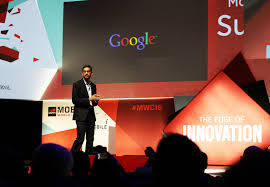Source: mercomindia.com
Google’s Chief Executive Officer (CEO) Sundar Pichai, in a video message, declared that Google had eliminated its carbon legacy. This brings Google’s lifetime net carbon footprint to zero, making it the first major company to accomplish this.
Carbon legacy refers to the carbon footprint of a company over a period of time. The carbon footprint is a measure of the impact of our activities on the amount of carbon dioxide produced through the burning of fossil fuels.
Pichai said in his message that the company eliminated its carbon legacy, including their operational emissions before they became carbon neutral in 2007, through the purchase of high-quality carbon offsets.
Pichai further added that since 2017 Google has been meeting all their annual electricity consumption with 100% renewable energy. Aiming big, by 2030, Google aims to run their business on carbon-free energy everywhere, at all times.
Pichai stated that Google would start by working towards a 24/7 carbon-free energy at all of its data centers and campuses worldwide. All Google tech and mobile applications will be powered by clean energy every hour of every day.
Google will invest in technologies to source reliable carbon-free energy in all locations, at all times of the day. This includes pairing wind and solar power sources together and increasing the use of battery storage.
Pichai also added that Google is working on ways to apply artificial intelligence (AI) to optimize their electricity demand and forecasting. These efforts are likely to help create 12,000 jobs by 2025.
Pichai said that the internet giant would enable 5 GW of new carbon-free energy across the company’s key manufacturing regions by 2030 through investment.
“We expect this to spur more than $5 billion in clean energy investments, avoid the amount of emissions equal to taking more than one million cars off the road each year, and create more than 8,000 clean energy jobs,” he said.
Google is also committing to help more than 500 cities and local governments globally reduce a total of 1 gigaton of carbon emissions annually by 2030, “That’s the equivalent of the annual carbon emissions of a country the size of Japan,” Pichai said.
Pichai stated that ‘machine learning’ has reduced the energy used for cooling Google data centers by 30%. Now, DeepMind and Google Cloud are making the cloud technology solution available globally for use by airports, shopping malls, hospitals, data centers, and other commercial buildings and industrial facilities.
In January 2019, Mercom had reported that Google had signed a long-term agreement to buy solar power from a 10 MW solar array, which is a part of a larger solar farm located in Tainan City. This was Google’s first purchase of renewable energy in Asia.
More recently, Candela Renewable, a U.S.-based utility-scale solar project developer, signed a power purchase agreement with Google for a 140 MW solar power project in Texas. This agreement is part of Google’s biggest renewable energy purchase ever, announced by them in September 2019, which is also the largest-ever corporate purchase of renewable power – overall.
